|

Truly Enjoyable
MARIA NOCKIN was at
Los Angeles Opera's 'La traviata'
With his opera La traviata, Giuseppe Verdi (1813-1901) crowned the achievement of his early years as a composer. His first opera, Oberto, premièred in 1839 and was a modest success, but he followed it with a failure. The comedy Un giorno di regno was not at all well received. As a result, he never again tried to be humorous until his last opera, Falstaff, more than fifty years later!
During the time it took for him to establish himself as a successful composer, Verdi suffered the loss of his first wife, Margherita, and the two children she bore him. His daughter, Virginia, died in 1838, his son, Icilio Romano, in 1839 and Margherita, herself, passed away the following year. With no family to care for, he threw himself into his work.
His first major success was Nabucco in 1842 which starred the then reigning soprano of the time, Giuseppina Strepponi. They began to see each other outside of the theater as well, but when they started living together many people found it scandalous. Giuseppina was not accepted by Italian society.
Thus, La Dame aux Camélias, the story by Alexandre Dumas fils, about the love of a proper gentleman for a socially unaccepted woman, had a special appeal for them. In 1852, Verdi and Strepponi were in Paris, then the center of artistic activity, where they saw a play made from the Dumas novel. Recalling the immensely favorable reaction to Rigoletto, Verdi again called on Francesco Maria Piave to fashion an opera libretto from the play. He then arranged to have the new work staged in Venice where the censors were relatively liberal.
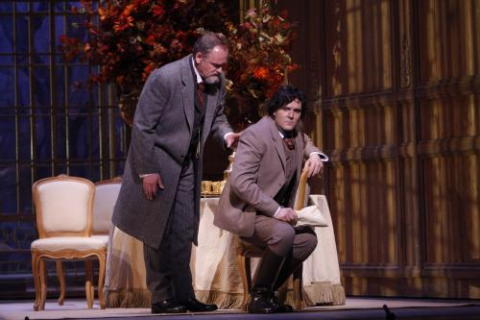
Andrzej Dobber as Giorgio Germont and Massimo Giordano as Alfredo in 'La traviata'. Photo © 2009 Robert Millard
|
The composer had no choice of singers for the première of La traviata and he was not happy with the cast he was given. As a result, he did not pay much attention to their strengths and weaknesses in composing the arias. The Violetta, Fanny Salvini-Donatelli, was anything but consumptive looking and the première on 6 March 1853 was nowhere near the success that Rigoletto had been. Now the third most popular opera in the United States after Puccini's Madame Butterfly and La bohème, La traviata had to be revised before it started on its road to fame.
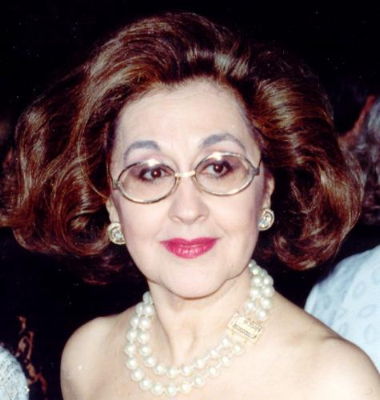
Marta Domingo
|
Los Angeles Opera's presentation for May and June was a traditional production of La traviata by Marta Domingo. She has matured as a director and almost all of the story of the opera came across the footlights in a natural and understandable manner. The only break in the continuity of the direction was the unforeshadowed appearance of a dancer representing Death in the final scene. Somehow it seemed a little out of place.
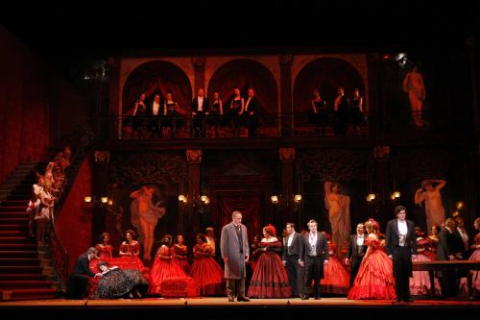
Flora's party: Ryan McKinny as Doctor Grenville, Marina Poplavskaya as Violetta, Andrzej Dobber as Giorgio Germont and Massimo Giordano as Alfredo. Photo © 2009 Robert Millard
|
Designer Giovanni Agostinucci presented a picture of the ultimate in nineteenth century opulence which fit the story well. The shows were double cast and the presentation on 10 June 2009 featured the second cast, which was in no way inferior to the group that had preceded it.
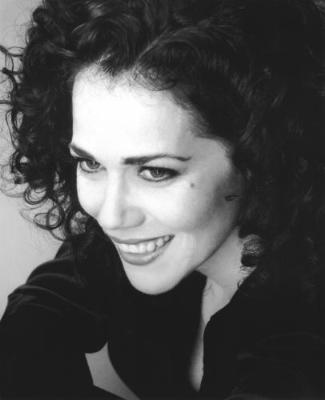
Elizabeth Futral
|
Violetta was first interpreted by Marina Poplavskaya, then by Elizabeth Futral who sang with great beauty of tone and was a most convincing woman in love. At first she shook off thoughts of a serious love affair with Alfredo, but as he pressed his case, she gradually gave in to him. At the opening of Act Two, only her illness seemed to stand in the way of their staying together. Russian tenor, Alexey Dolgov, who succeeded Massimo Giordano in the role of Alfredo, was a slow starter. Vocally, he came into his own in the second act, however, and gave a strong performance from then on.
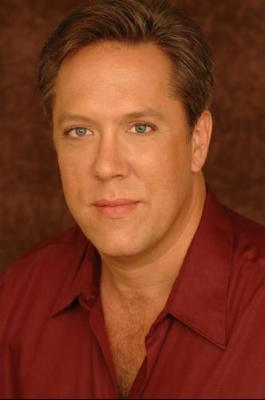
Stephen Powell
|
Polish baritone Andrzej Dobber sang the elder Germont for the first few performances and was then followed by the powerful voiced American, Stephen Powell. Powell is a charismatic actor with an exciting timbre who imbued his lines with emotional conviction. Other members of the cast stayed the same. Margaret Thompson was an elegant, warm voiced Flora who made the most of her small part.
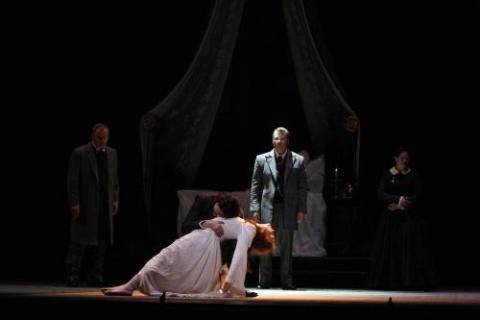
Flora's party: Andrzej Dobber as Giorgio Germont, Marina Poplavskaya as Violetta, Massimo Giordano as Alfredo, Ryan McKinny as Doctor Grenville and Erica Brookhyser as Annina. Photo © 2009 Robert Millard
|
Tenor Hak Soo Kim, a current member of the Domingo Thornton Young Artist Program, was a Gastone with an impressive ring to his voice. It will be interesting to hear more from him. Daniel Armstrong was a credible Marquis and Philip Cokorinos a worthy Baron. Erica Brookhyser's Annina was most caring and sympathetic, while Ryan McKinny portrayed a most professional doctor.
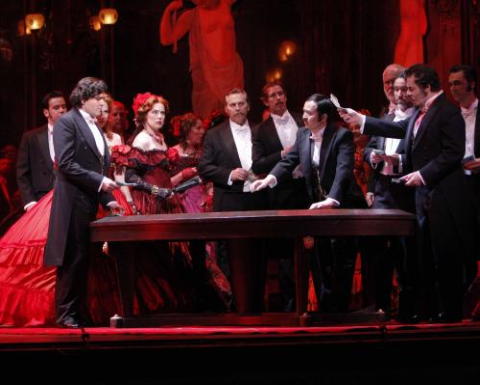
Final scene: Massimo Giordano as Alfredo, Margaret Thompson as Flora and Hak Soo Kim as Gastone. Photo © 2009 Robert Millard
|
This was Grant Gershon's first assignment as a conductor and he fulfilled it very well indeed. Well known as a chorus master, it was no surprise that his choral group was always in tune. We found out that he does equally well with instrumentalists. His tempi were brisk, except for the final scene, but even then they did not drag. This was a truly enjoyable production with which to end the Los Angeles Opera season.
Copyright © 1 July 2009
Maria Nockin,
Arizona USA

LA TRAVIATA GIUSEPPE VERDI FRANCESCO MARIA PIAVE LOS ANGELES OPERA MARINA POPLAVSKAYA ELIZABETH FUTRAL GRANT GERSHON LOS ANGELES UNITED STATES OF AMERICA ITALY
|

